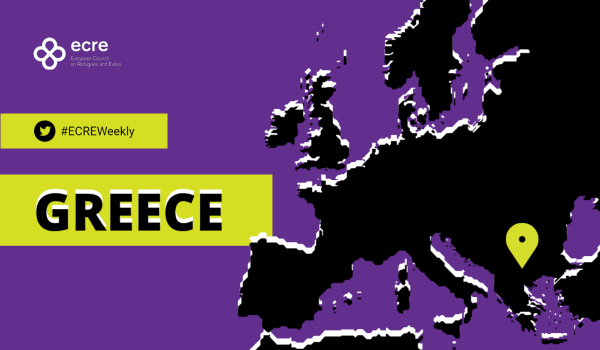The Greek government is welcoming Ukrainian refugees, guaranteeing reception capacity and support, while the situation for asylum seekers and refugees in camps across Greece remain dire and support is lacking. The Greek National Transparency Authority found “no evidence to corroborate” mounting evidence of pushbacks from Greece.
According to authorities by 25 March a total of 14,429 Ukrainian refugees including 4,580 children had crossed the border to Greece. On March 25 alone, 278 Ukrainian refugees entered, of which 74 were children. Greek authorities have applied an unusually welcoming approach to the specific group of refugees from Ukraine and Minister of Migration and Asylum, Notis Mitarakis recently stated “We are ready for the hospitality arrangements. And we are ready to register people and provide them with temporary protection”. According to the minister: “The national reception system has the immediate availability of 15,000 beds” – a capacity that can be upgraded to 30,000. Greek authorities have prepared a container camp for those arriving from Ukraine through the Bulgarian border: “open 24 hours with staff from the nearby camps. Once they enter we provide them with pamphlets with numbers they may need, we give the cell-phone cards, we provide them with any information they might need”. Further, initiatives include an electronic pre-registration platform allowing personalised appointments at the Asylum Service Offices, a dedicated jobsite and a website with relevant information. While, Mitarakis has labelled people arriving from Ukraine “real refugees,” leading politicians have defined asylum-seekers from the Middle East or Africa as “illegal immigrants,” and the differential ‘welcome’ reportedly creates tension and frustration among other groups.
The roughly 1,750 people including 450 women and children remaining in the Mavrovouni camp on Lesvos also referred to as Moria 2.0 are facing strict physical control, mandatory return after 9 pm, police patrols inside the camp and are exposed to sewage and dirt. Reportedly, the majority of the camp residents are unlikely to be granted protection because of the Joint Ministerial Decision (JMD) from June 2021, when Greece unilaterally declared Turkey a safe third country for asylum-seekers originating from Afghanistan, Bangladesh, Pakistan and Somalia, and Syria. Refugee Support Aegean (RSA) has released a series of International Organization for Migration (IOM) statistics from January 2022 illustrating the dire situation for some 15,226 people residing in 24 camps on the Greek mainland. 3,100 of which are unregistered and 5,750 of which are children. More than 90 per cent of camp population above the age of 15 lacks unemployment cards (OAED) and cannot apply for specific benefits or employability programs nor benefit from free public transportation. More than 40 per cent above the age of 18 lack a tax number needed to open a bank account, rent a flat, work or apply for rental subsidies. 14 per cent lacks a Social Security Number (AMKA), and thereby access to health care and medicine.
On 24 March Greek National Transparency Authority completed an investigation that began in November 2021 after Lighthouse Reports and Der Spiegel documented systematic pushbacks by Greek authorities. While the findings have not been released to the public a statement put out by the government body on 29 March, concludes that no evidence was found to “corroborate” any allegations of pushbacks or wrongdoings by Greek authorities – “informal obligatory returns” of asylum-seekers by masked men “were not confirmed”. In a sarcastic comment, Giorgos Christides writing on Greece for Der Spiegel stated: “I am certain the authority will now honour its middle name and publish the investigation to allow outside scrutiny”. Meanwhile, reports of pushbacks continues to mount leaving both people arriving irregularly and NGOs in constant alert. On 27 March a journalist based on Lesvos, wrote: “Yesterday a boat carrying ~ 50 arrived on Lesvos. For hours people were hiding and reportedly split up in groups, fearing to be pushed back to Turkish waters by Greek authorities, as it is happenings many times”. On 28 March the NGO hotline Alarm Phone reported of 6 people stranded on the Greek island of Kos, stating: “So far, we have not been able to establish direct contact to the missing and authorities did not share any information. Have they been pushed back? We demand clarification!”. The hotline again on March 30 reported of 20 people in distress in the Aegean off Rhodes. According to the organisation a vessel from the Hellenic Coast Guard: “arrived on scene and took the people on board” leaving a “high risk of an illegal pushback”. On 31 March Alarm Phone and Border Violence Monitoring Network (BVMN) demanded action from Greek authorities and the European Border and Coast Guard Agency (Frontex) to rescue 34 people including a pregnant woman and six children under the age of 10 stuck on an islet in the Evros river that has been the scene of countless pushbacks.
For further information:
- ECRE, Greece: Group Stranded in Evros Rescued After ECtHR Intervention, Complaint Against Frontex Lodged Before ECJ as Details of OLAF Report are Revealed, Relocation Scheme Launched as Authorities Ramp Up Support to Ukrainians, March 2022
- ECRE, Greece: Civil Society Organisations Demand EU Action on Third Country Concept, Pushbacks Continue with Frontex Involvement, Ukrainians Receive Access to Housing, Medical Care and Work While Regular Reception Remains Dire, March 2022
This article appeared in the ECRE Weekly Bulletin. You can subscribe to the Weekly Bulletin here.

